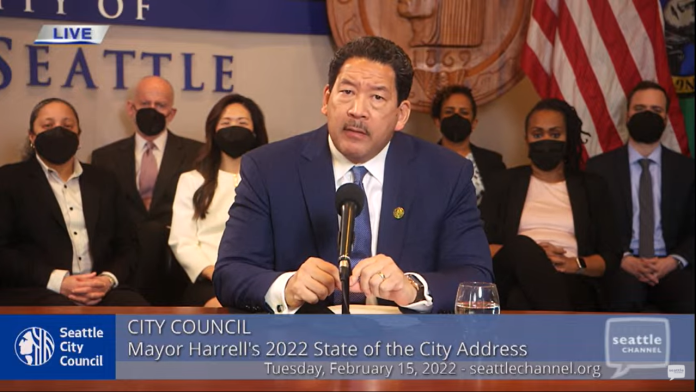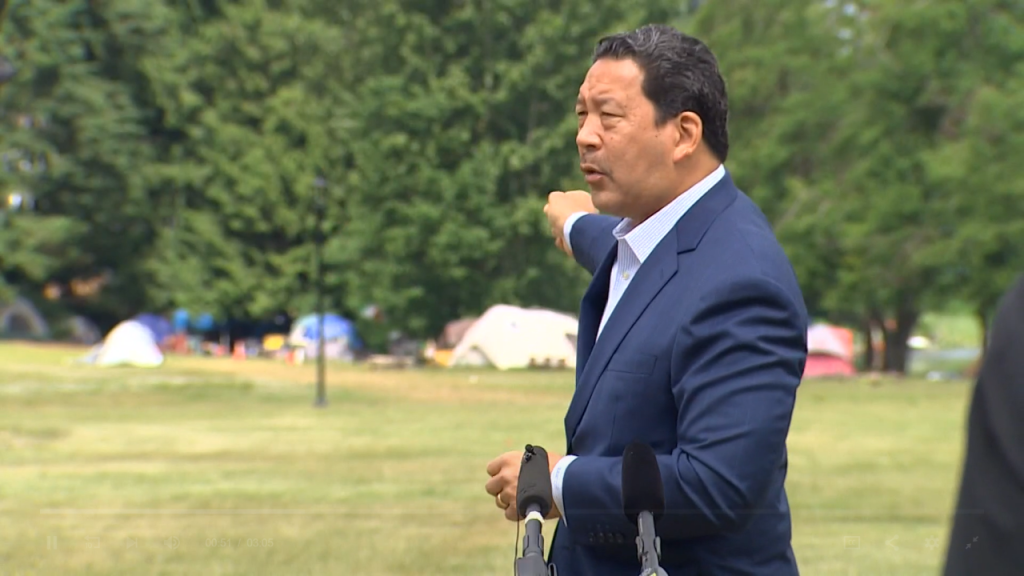
The Mayor asked for budget cuts from other city departments to close an anticipated $150 million funding gap next year.
Mayor Bruce Harrell delivered his first state of the city speech yesterday at Seattle City Hall and struck similar notes as he did on the campaign trail. He stressed clearing homeless encampments, staffing up the Seattle Police Department (SPD), and getting back to the basics, with numerous informational dashboards promised to chart progress.
“Quite candidly, perhaps because of the pandemic, I did not inherit clear departmental systems to adequately address the issues of public safety or homeless,” Harrell said. “I’d like to be clear on a point: I’d believe in going back to the basics. That’s where good governance begins. The basics includes efforts like our Housing First policy, fixing a pothole, making sure our sidewalks and parks are safe for families to use, making sure we are enforcing our criminal laws against those who are harming others.”
The mayor singled out Woodland Park as a park he’d be clearing of encampments as soon as possible in partnership with Councilmember Dan Strauss, whose 6th District encompasses the area. “Trash, fires, and inhumane conditions” associated with the Woodland Park encampments were unacceptable, he said.
The issue of policing composed the lion’s share of his speech. Harrell made a hiring pitch, asking people to apply to fill the 125 SPD positions funded in the last budget and pledging he’d hire the “right kind of officer” and lower response time to calls. It’s not clear a significant response time reduction could be achieved from a net gain of 35 officers (the city projects 90 separations to go with the 125 additions). Harrell also promised his administration would end the federal consent decree, which has been in place for nearly a decade, by demonstrating SPD is a successfully reformed department. He also expressed confidence his approach to public safety is aligned with new City Attorney Ann Davison — the first Republican elected in Seattle in decades — who ran on a hardline platform incorporating largely debunked tenets of broken windows policing.
In contrast, the mayor said he has asked other city departments to come up with budget reductions to close a 2023 budget shortfall presently estimated at $150 million. JumpStart Seattle corporate payroll tax revenues coming in more than $30 million above projections does offer some relief, as Councilmember Teresa Mosqueda noted in a Monday press release.
Harrell teased a “major” announcement regarding affordable housing production later in the week, hinting King County Executive Dow Constantine, King County Regional Homelessness Authority CEO Marc Dones, and philanthropic partners would join him. Last week, PubliCola‘s Erica Barnett reported some preliminary details on that announcement, which apparently will be focused on funding a peer navigator program. During his campaign, Harrell promised he would create 2,000 units of emergency housing units in his first, echoing the Compassion Seattle plan, which a judge barred from going on the ballot. That could be a tall order, and the Mayor hasn’t yet revealed his exact plan to achieve it.
“The homelessness crisis must be treated like the crisis it is,” Harrell said, adding he found the cross-department coordination he inherited from his predecessor Mayor Jenny Durkan to be lacking. Six departments had six different system for tracking homeless people, he alleged. He also pledged to break down departmental siloes at the regional level and continue to regionalize the response to homelessness, as Durkan also sought to do and took some initial steps toward setting in motion.

Green jobs was another point of emphasis, and Harrell promised a white paper for the council ahead of budget season laying out his vision for a jobs center and what the city would build, perhaps under the auspices of the Seattle Green New Deal.
Mayor Harrell namedropped each and every councilmember, suggesting he’d work with them all on shared priorities. In some cases, he may oversold the opportunity for collaboration or rested heavily on symbolic gestures. His office also noted it was the first time a state of the city speech had been delivered in council chambers since 2016 — as Mayor Durkan abandoned the custom in her tenure and eventually condensed the annual speech down to just six minutes in her final year — Harrell’s first speech clocked in at a more robust 32 minutes.
But whether the gestures are primarily symbolic or not, Council has seemed to join in the optimism and renewed efforts at collaboration, perhaps relieved after four years of intransigence from Mayor Durkan.
How long the cathartic moment for the executive and legislative branch lasts is anyone’s guess.
The emphasis on staffing up at SPD and relying on prison sentences to reduce crime has already run into resistance from the Decriminalize Seattle Coalition, who criticized the Seattle Police Officers Guild recent #RefundSPD campaign aimed at stroking crime fears and demanding more funding for police. That campaign has include a public safety threat index reminiscent of George W. Bush’s terror alert system.
Such an aggressive campaign in the midst of police contract negotiations suggests the guild wants to drive a hard bargain, which could complicate Mayor Harrell lofty goals to jumpstart stalled police reform efforts, end the federal consent decree, eliminate biased policing, and increasing public safety.
Likewise building enough permanent housing and temporary shelter to end the homelessness crisis will not be easy or cheap, despite the promises made by the Compassion Seattle campaign that former fill-in Mayor Tim Burgess led — Burgess is now Harrell’s Director of Strategic Initiatives and stood in the crowd behind him during the speech. Whether building 2,000 new emergency housing units in one year will be possible without new funding remains to be seen.
Studies have repeatedly found it will take major investment — perhaps $1 billion per year for a decade — to solve the crisis, and the philanthropic push that Harrell has promised alone is unlikely to cut it. Nor has Harrell jumped on the opportunity to add single-family zoning reform to the toolbox to increase housing options in Seattle, expressing concerns rather than wholeheartedly backing Governor Jay Inslee’s statewide missing middle housing bill. On Tuesday, that bill died in the State House, never getting called to a vote for lack of support as the house of origin deadline passed.
Already signs of friction are emerging. Harrell opted to end the city’s eviction moratorium at month’s end, which is likely to lead to more housing insecurity and people entering homelessness. Councilmembers Tammy Morales, Kshama Sawant, and Mosqueda criticized that decision during Council Briefing on Monday. Sawant introduced legislation to extend the moratorium, while Morales urged the mayor to reconsider.
Six weeks into his tenure, Mayor Harrell has coasted on lofty rhetoric and promises of plans to come, but the devil will be in the details.
Doug Trumm is publisher of The Urbanist. An Urbanist writer since 2015, he dreams of pedestrian streets, bus lanes, and a mass-timber building spree to end our housing crisis. He graduated from the Evans School of Public Policy and Governance at the University of Washington in 2019. He lives in Seattle's Fremont neighborhood and loves to explore the city by foot and by bike.

